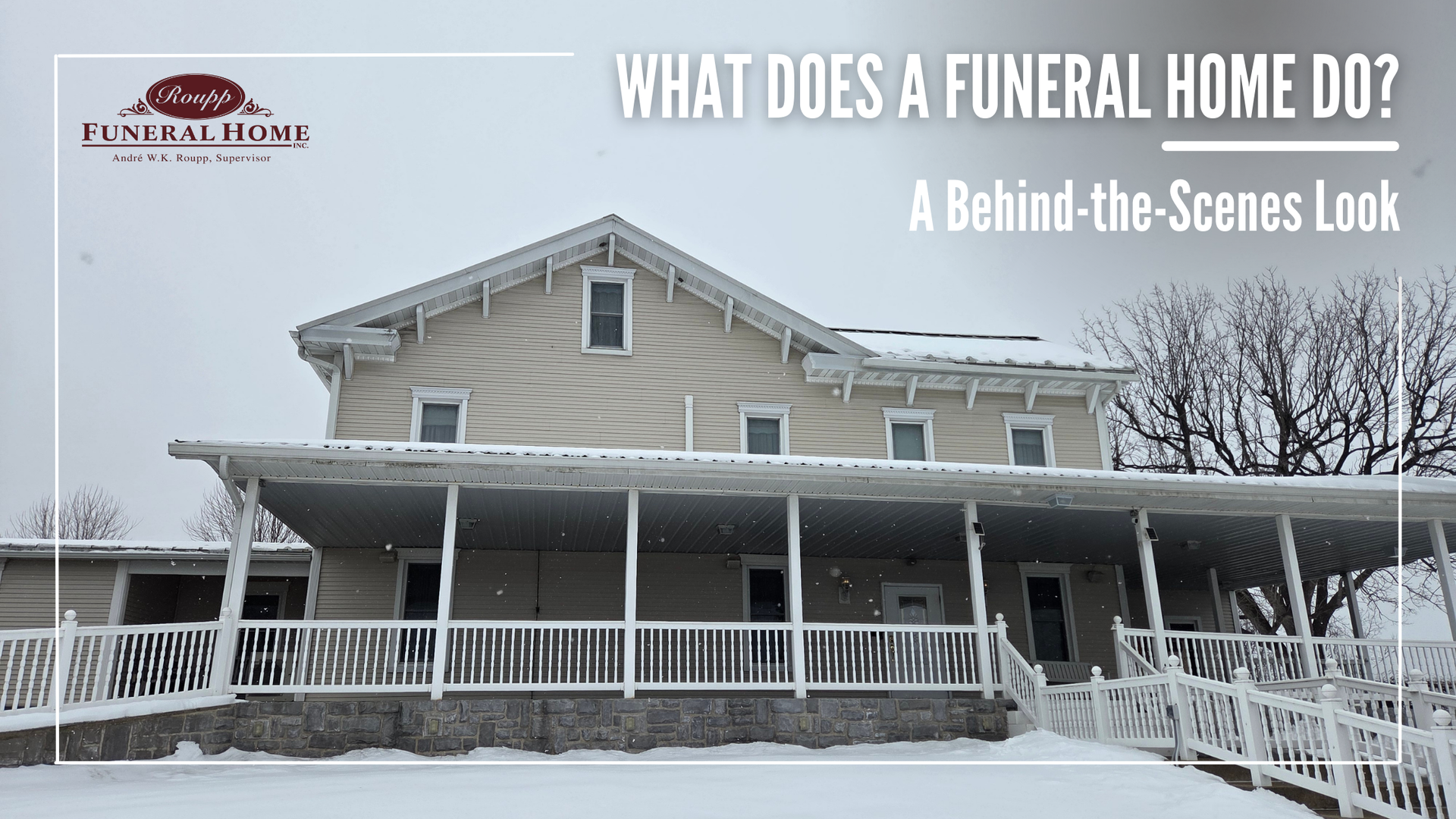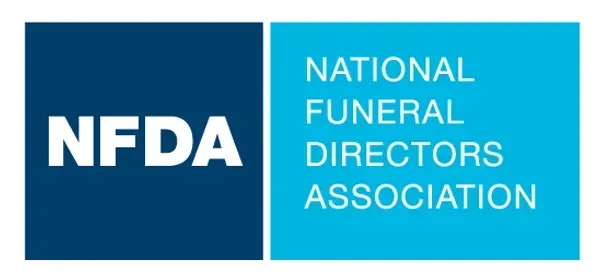Roupp Funeral Home Blog
Keep up with the latest news, events, and information from Roupp Funeral Home here at our blog.
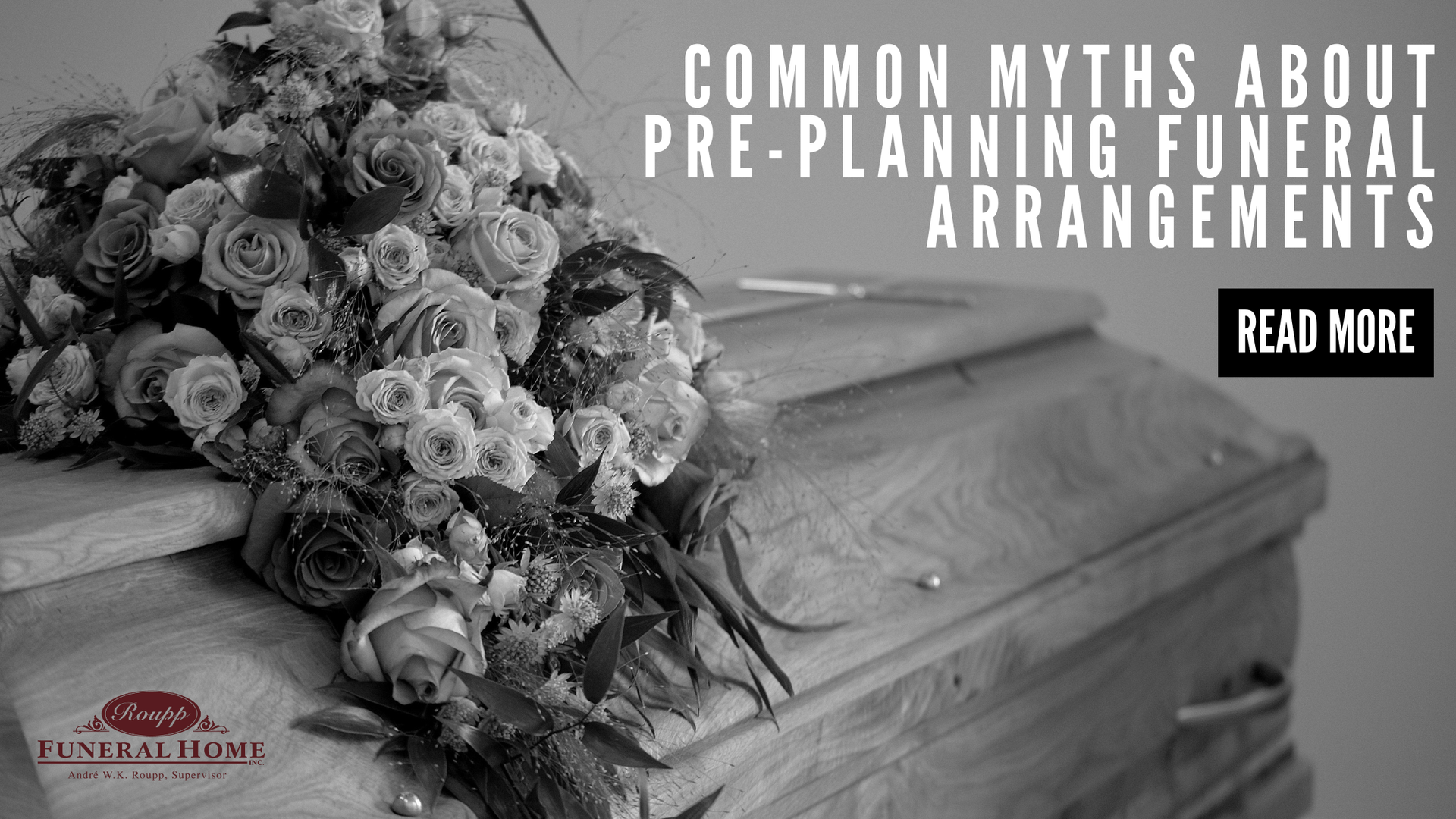
When people hear the words “funeral pre-planning,” many immediately feel uncomfortable. It’s a topic often surrounded by emotion, misconceptions, and unnecessary fear. Because of that, many families delay important conversations, sometimes until they are forced to make difficult decisions during a time of grief. At Roupp Funeral Home, we believe education brings peace of mind. Pre-planning is not about focusing on death - it’s about protecting the people you love, honoring your wishes, and easing emotional and financial burdens in the future. Let’s take a closer look at some of the most common myths about pre-planning funeral arrangements and the truth behind them. Myth #1: “Pre-planning is only for the elderly.” One of the biggest misconceptions is that advance funeral planning is something only seniors need to think about. The reality is, pre-planning is for adults of any age. Life is unpredictable, and having arrangements in place ensures that your family is never left guessing about your wishes. Whether you are newly married, raising children, caring for aging parents, or planning for retirement, pre-planning is a thoughtful step that provides clarity and protection. Many people in their 30s, 40s, and 50s choose to plan ahead, not because something is wrong, but because they want to make responsible, loving decisions for the future. Myth #2: “It’s depressing and morbid.” While it’s natural to feel hesitant about the topic, most families are surprised to find that pre-planning is actually empowering and comforting. Instead of being overwhelmed later, you are able to: Make decisions calmly and thoughtfully Explore options without pressure Express what truly matters to you Lift a heavy emotional burden from your loved ones Many families tell us they feel relief after pre-planning, not sadness. Knowing things are taken care of allows you to focus more fully on living. Myth #3: “My family will know what I want.” Even in the closest families, assumptions can be wrong. When there are no plans in place, loved ones are often left wondering: Burial or cremation? Religious or non-religious service? Public memorial or private gathering? Which music, readings, or traditions matter most? Without guidance, families may struggle with guilt, disagreement, or fear of “getting it wrong.” Pre-planning removes uncertainty. It ensures your wishes are clearly documented and allows your family to focus on honoring your life rather than making stressful decisions. Myth #4: “Pre-planning means everything is paid for immediately.” Pre-planning and pre-funding are not the same thing. Pre-planning simply means documenting your wishes. Some people choose to pre-fund arrangements, while others only want to outline preferences. Both options are available, and neither is required to begin planning. At Roupp Funeral Home, we walk families through flexible options so they can choose what feels right for their situation, comfort level, and budget. Myth #5: “It’s too complicated.” Another common fear is that the process will be overwhelming or filled with difficult decisions. In reality, pre-planning is a guided, supportive conversation. Our role is to educate, answer questions, and help you explore possibilities step by step. Many people are relieved to discover they don’t need all the answers right away. Planning can start simply and evolve over time. Myth #6: “Pre-planning is only about logistics.” While arrangements do involve practical details, pre-planning is also about something much deeper: legacy, values, and love. It allows you to think about: How you want to be remembered What brings comfort to your family What traditions or personal touches matter How you want your life honored Pre-planning creates space for meaning, not just decisions. The True Benefits of Pre-Planning Funeral Arrangements When myths are set aside, the benefits become clear: Reduces emotional stress on loved ones Provides financial clarity and options Ensures personal wishes are honored Encourages important family conversations Brings peace of mind and confidence Above all, it is a gift to those you love. Register for our Free February Planning Seminar To help families feel more informed, confident, and supported, Roupp Funeral Home is hosting a Free Advanced Planning Seminar on February 10 , with two available sessions at 10:00 AM or 6:00 PM . We invite you to choose the time that works best for you and join us for this meaningful educational event. We know many people want to protect their loved ones from stress, uncertainty, and difficult decisions during a time of loss, but knowing where to begin can feel overwhelming. This seminar was created to gently guide you through the process, answer common questions, and provide clarity in a comfortable, welcoming setting. During this informative session, you’ll learn about advanced funeral planning options and how making decisions ahead of time can ease both the emotional and financial burden placed on families. Our knowledgeable speakers will also share common challenges families face when no plans are in place and how thoughtful planning can help avoid unnecessary stress. During the seminar, you will: Review burial and cremation options Take a guided tour of our facility Have the opportunity to ask questions in a relaxed, supportive environment Receive helpful information regarding veterans and Medicaid planning Take home a FREE packet of planning materials to continue the conversation at your own pace Please note: our weekly Grief Support Group will be canceled on February 10th to allow space for this special educational event. Seating is limited. RSVP is required. We encourage you to reserve your seat by calling 800.692.8494 . We look forward to welcoming you and helping you take an important step toward peace of mind, for yourself and for those you love.
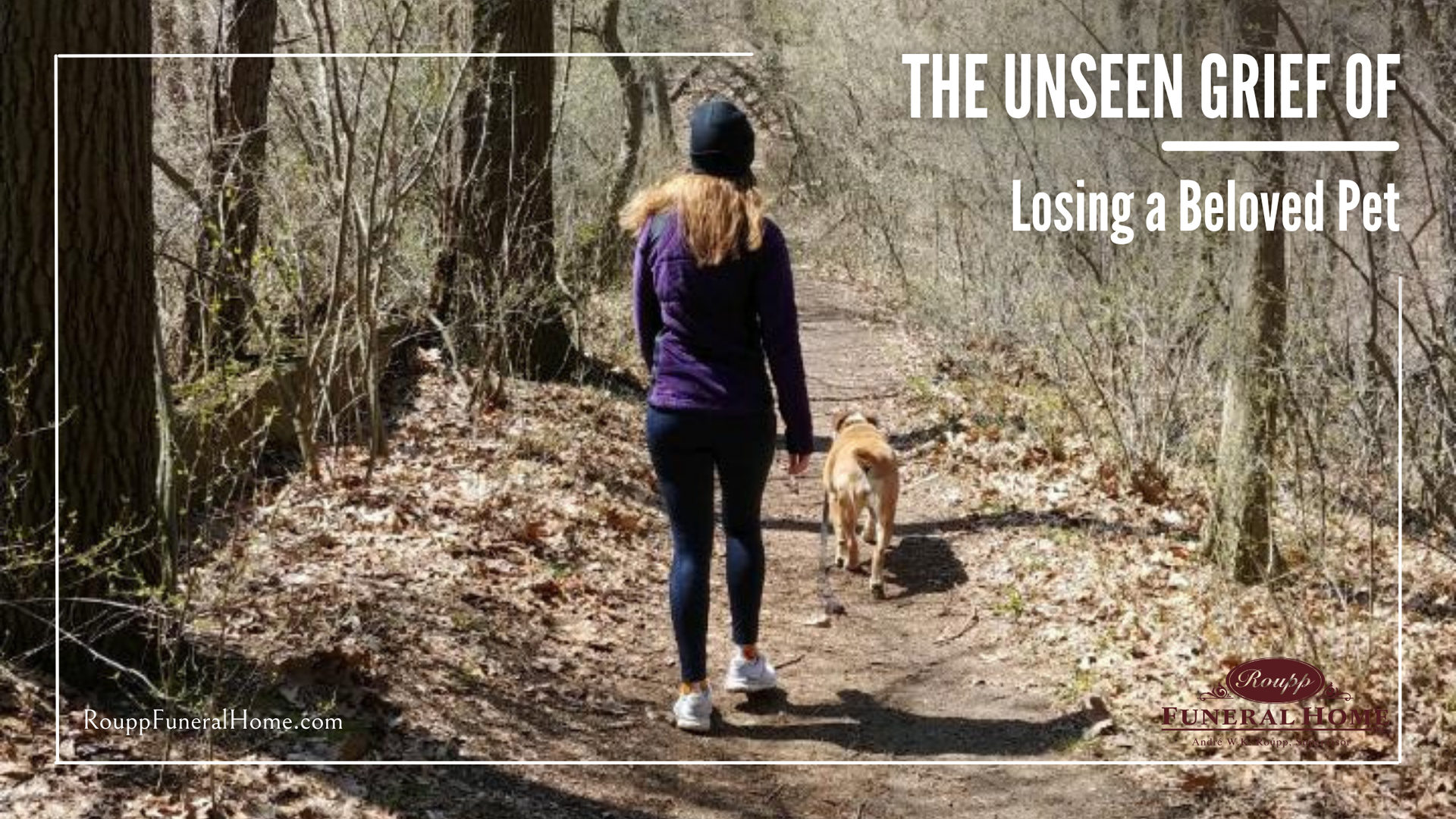
Losing a pet is a unique kind of heartbreak. For many, pets are more than animals - they’re family members, loyal companions, and constant sources of comfort. When they pass, it’s not just the loss of a furry friend. You lose a part of your daily life, your routine, your safe space, and, in many ways, your child. At Roupp Funeral Home, we understand that pet loss is a profound experience. While society sometimes minimizes this grief, calling it “just a pet,” we know that the emotional impact is real and significant. If you’re feeling the weight of this loss today, know that you are not alone. The Emotional Impact of Losing a Pet Pets provide unconditional love, companionship, and stability. They greet you at the door, comfort you when you’re down, and are there for life’s everyday moments. Losing this presence can feel like losing a member of your family. The grief that follows a pet’s death can be complex: Loss of routine: Walking, feeding, and caring for your pet were daily habits. Their absence can leave a void in your everyday life. Loss of comfort and security: Pets often provide emotional support and a sense of safety, especially during stressful times. Loss of companionship: Whether it’s a quiet evening at home or a playful morning, the companionship your pet offered is irreplaceable. Loss of unconditional love: Pets offer a unique kind of love - nonjudgmental, constant, and pure. Recognizing these feelings is the first step toward healing. There is nothing “small” about the grief you feel after losing a pet. Coping With Pet Loss Everyone experiences grief differently, and there’s no right or wrong way to mourn. Here are some ways to navigate this difficult time: Allow yourself to grieve Don’t feel pressured to “move on” quickly. It’s normal to feel sadness, anger, or even guilt. Give yourself permission to feel. Create a memorial or tribute Honoring your pet’s memory can provide comfort. Some families create photo albums, plant a tree, or hold a small ceremony. Reach out for support Talk to friends or family who understand the bond you shared. Consider joining a pet loss support group to connect with others experiencing similar grief. Establish new routines While it may be difficult at first, creating new habits can help fill the space left behind and gradually restore a sense of normalcy. Consider professional support If grief feels overwhelming, speaking with a counselor or grief specialist can be helpful. Even pet loss counselors are available in many areas. You Are Not Alone The bond between a person and their pet is profound. Losing that connection can shake your emotional foundation, but it’s important to remember that grief is a sign of love. By acknowledging your feelings, seeking support, and honoring your pet’s memory, you can begin to find healing while keeping their spirit alive in your heart. At Roupp Funeral Home, we recognize all forms of loss and grief, whether it’s the passing of a loved one or a cherished pet. You don’t have to navigate this journey alone. Reach out, share your story, and allow yourself the care and support you deserve. Our Navigating Grief support program meets bi-annually, offering a safe space to process loss and connect with others who understand. Right now, join our weekly Winter Grief Support Group every Tuesday at 6:30 PM through February 24th . Free to attend and open to anyone coping with loss including the loss of a beloved pet. Everyone is welcome to join and find comfort in community.

For many people, the holiday season is filled with expectations of togetherness, joy, and tradition. When you’re grieving the loss of a loved one, those expectations can feel especially heavy. And while the holidays themselves can be difficult, many people are surprised to find that their grief feels even heavier after the holidays are over . If you’ve entered the new year feeling emotionally drained, sad, or disconnected, you are not alone, and there is nothing wrong with you. January often brings what many describe as an emotional crash . The decorations come down, routines return, and the world seems to move on, even though your heart may still be catching up. The Emotional “Crash” After the Holidays During November and December, many grieving individuals operate in a kind of emotional survival mode. There are events to attend, family obligations, traditions to manage, and social expectations to meet. Even if the holidays were quiet or low-key, they often require extra emotional energy. You may find yourself: Holding it together for others Staying busy to avoid painful emotions Focusing on “getting through” each day Once the holidays pass, that structure disappears. The calendar clears. The distractions fade. And suddenly, there is space. A space where grief can feel louder and heavier than before. This emotional drop can be jarring, especially when a new year is culturally framed as a time of fresh starts and positivity. While others may feel hopeful or motivated, you may feel the opposite: tired, sad, or deeply lonely. Why Grief Can Feel Delayed One reason grief often intensifies after the holidays is delayed grief . When you’re in a period that requires emotional endurance, such as the holiday season, your mind and body may temporarily suppress deeper feelings simply to get through it. When life slows down in January, those emotions finally have room to surface. Delayed grief doesn’t mean you’ve been avoiding your loss or grieving “incorrectly.” It’s a natural response to emotional overload. Grief often unfolds in waves, and it’s common for those waves to arrive when things become quieter. You might notice: Strong emotions appearing unexpectedly Increased sadness or tearfulness A sense that the loss feels “new” again Guilt for feeling worse now than you did during the holidays All of these experiences are normal. The Exhaustion of Grieving Through the Holidays Grief is not just emotional; it is physical. The holidays often demand more from us at a time when we already feel depleted. By January, many grieving individuals are simply exhausted . Grief-related exhaustion may look like: Trouble sleeping or sleeping too much Difficulty concentrating Low energy or motivation A sense of heaviness in the body Winter can intensify this fatigue. Shorter days, cold weather, and reduced social interaction may amplify feelings of isolation and sadness, especially for those already navigating loss. If you feel worn down, it doesn’t mean you’re not healing. It means you’ve been carrying a lot. When the World Moves On, But Your Grief Doesn’t One of the most painful parts of post-holiday grief is the feeling that support suddenly disappears . During the holidays, people may check in more often or acknowledge your loss. Once January arrives, those conversations often stop, not because others don’t care, but because they assume you’re “doing better.” Grief doesn’t follow a calendar. It doesn’t reset with the new year. And it doesn’t end because the holidays are over. It’s okay if: You’re still struggling You don’t feel ready for “normal” yet The new year feels overwhelming instead of hopeful Your timeline is your own. Giving Yourself Permission to Feel What You Feel January can bring pressure to set goals, embrace positivity, or “move forward.” For someone who is grieving, that pressure can feel isolating or even painful. Instead of asking yourself what you should feel, try allowing yourself to feel what is actually present. That might mean: Taking things one day at a time Saying no to unnecessary obligations Seeking quiet moments of rest and reflection Reaching out for support when the weight feels too heavy Grief is not something to fix; it’s something to be carried with care. Support During the Quiet Months If grief feels heavier after the holidays, it may be a sign that you could benefit from additional support. Many people find January to be a meaningful time to connect with grief support groups, counseling, or community resources, when things are quieter, and there is space to focus on healing. At Roupp Funeral Home , we believe care doesn’t end after the service. We are committed to supporting families as they continue their grief journey, long after the holidays have passed. Join us for our Winter Grief Support Group Program - Navigating Grief taking place every Tuesday in 2026 until February 24th at 6:30pm. If you are struggling, know that you don’t have to walk this season alone. These sessions are open to all at no cost. To learn more, please visit: https://www.eventbrite.com/e/1967664846524
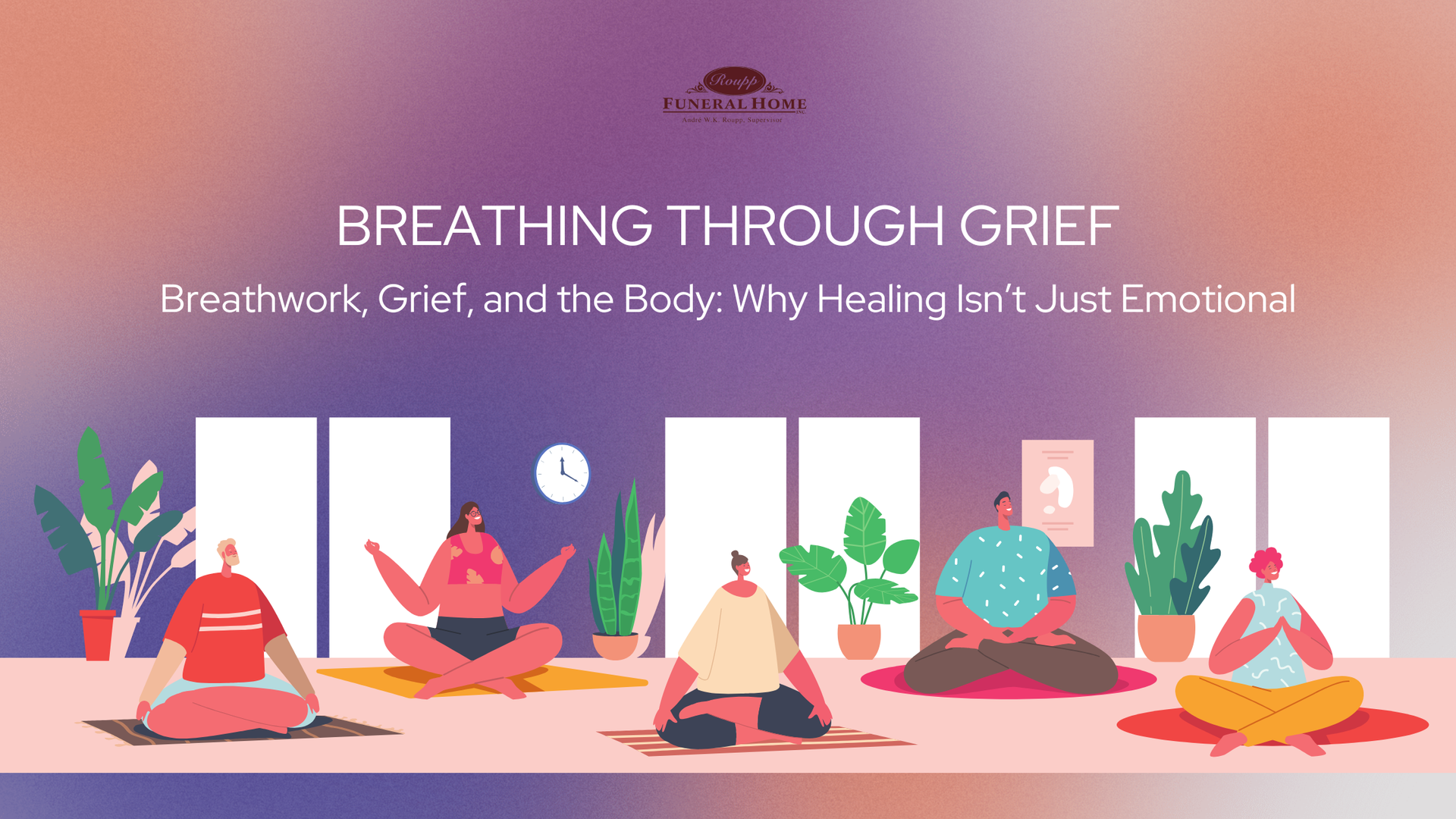
When people think about grief, they often think of emotions like sadness, anger, confusion, or longing. But grief doesn’t live only in the heart or the mind. Grief lives in the body , too. For many who are grieving, the body holds tension, fatigue, restlessness, and pain long after words feel unavailable. This is why healing after loss isn’t just emotional, it’s physical, nervous-system-based, and deeply embodied. Understanding how grief affects the body can be an important step toward gentler, more complete healing. How Grief Lives in the Body Grief activates the body’s stress response. When a significant loss occurs, the nervous system often shifts into a state of heightened alert, commonly known as fight, flight, or freeze . While this response is protective in the short term, it can become exhausting when grief is prolonged. You may notice physical symptoms such as: Tightness in the chest or throat Shallow breathing or frequent sighing Fatigue or heaviness in the body Restlessness, anxiety, or difficulty sleeping Headaches, muscle tension, or digestive changes These symptoms are not signs that something is “wrong” with you. They are signs that your body is responding to loss in the way it knows how. Why Talking Isn’t Always Enough Talking about grief can be helpful, but many people find that words alone don’t fully address what they’re feeling. This is because grief is not just a cognitive experience ; it’s a physiological one. Sometimes the body needs support before the mind can feel relief. When grief is stored in the body, it may show up as: Feeling stuck or numb Feeling overwhelmed without knowing why Becoming easily triggered or emotionally flooded Difficulty relaxing, even in safe environments This is where body-based practices, such as breathwork, can play a meaningful role. What Is Breathwork? Breathwork is a gentle, intentional practice that focuses on using the breath to support the nervous system. Unlike everyday breathing, breathwork invites awareness, slowing, and regulation, helping the body shift out of stress and into a state of safety and calm. In the context of grief, breathwork can help: Release physical tension held in the body Calm the nervous system Create space for emotions to move without force Encourage grounding and presence Support rest and emotional regulation Breathwork does not require you to relive your loss or “fix” your grief. Instead, it offers a quiet way to listen to the body and respond with care. When the nervous system feels safe, the body is better able to process loss. Breathwork works by signaling safety, slowing the heart rate, softening muscle tension, and deepening the breath. This can be especially helpful for those who: Feel emotionally overwhelmed Struggle with anxiety or panic related to grief Feel disconnected from their body Have difficulty resting or sleeping For many, breathwork becomes a way to meet grief without pressure. Allowing emotions to surface naturally, at a pace the body can handle. Breathing Through Grief The winter months, especially after the holidays, can feel quiet and heavy. January often brings fewer distractions and more space, sometimes more space than feels comfortable when you’re grieving. This quieter season can also be a meaningful time to focus on gentle care, reflection, and support. Practices like breathwork align naturally with winter’s slower rhythm, offering warmth, grounding, and connection during a time that can feel isolating. In recognition of how deeply grief affects both the body and the mind, Roupp Funeral Home is offering a Breathwork for Grief session on January 20th , as part of our continued commitment to supporting families beyond the funeral service. This session is designed to: Provide a safe, supportive space for grief Offer gentle breathwork practices accessible to all Support relaxation and nervous system regulation Allow participants to connect with their grief without pressure or expectation No prior experience with breathwork is required. This session is not about forcing healing, it’s about creating space for it. Open to all at no cost. To learn more, and to reserve your spot, please visit: https://www.eventbrite.com/e/breathing-through-grief-tickets-1977966789914 You Don’t Have to Carry Grief Alone Grief asks a lot of the body. If you’ve been feeling exhausted, tense, or disconnected, it may be your body’s way of asking for care. Healing doesn’t mean forgetting. It doesn’t mean moving on. It means learning how to carry loss in a way that honors both your loved one and yourself. At Roupp Funeral Home , we believe that grief support should be compassionate, holistic, and ongoing. Whether through conversation, community, or body-based practices like breathwork, we are here to walk alongside you during the holidays, after them, and in the quiet months in between. If you feel called to explore a gentler way of supporting your grief, we invite you to join us. You are not alone and your body deserves care, too.
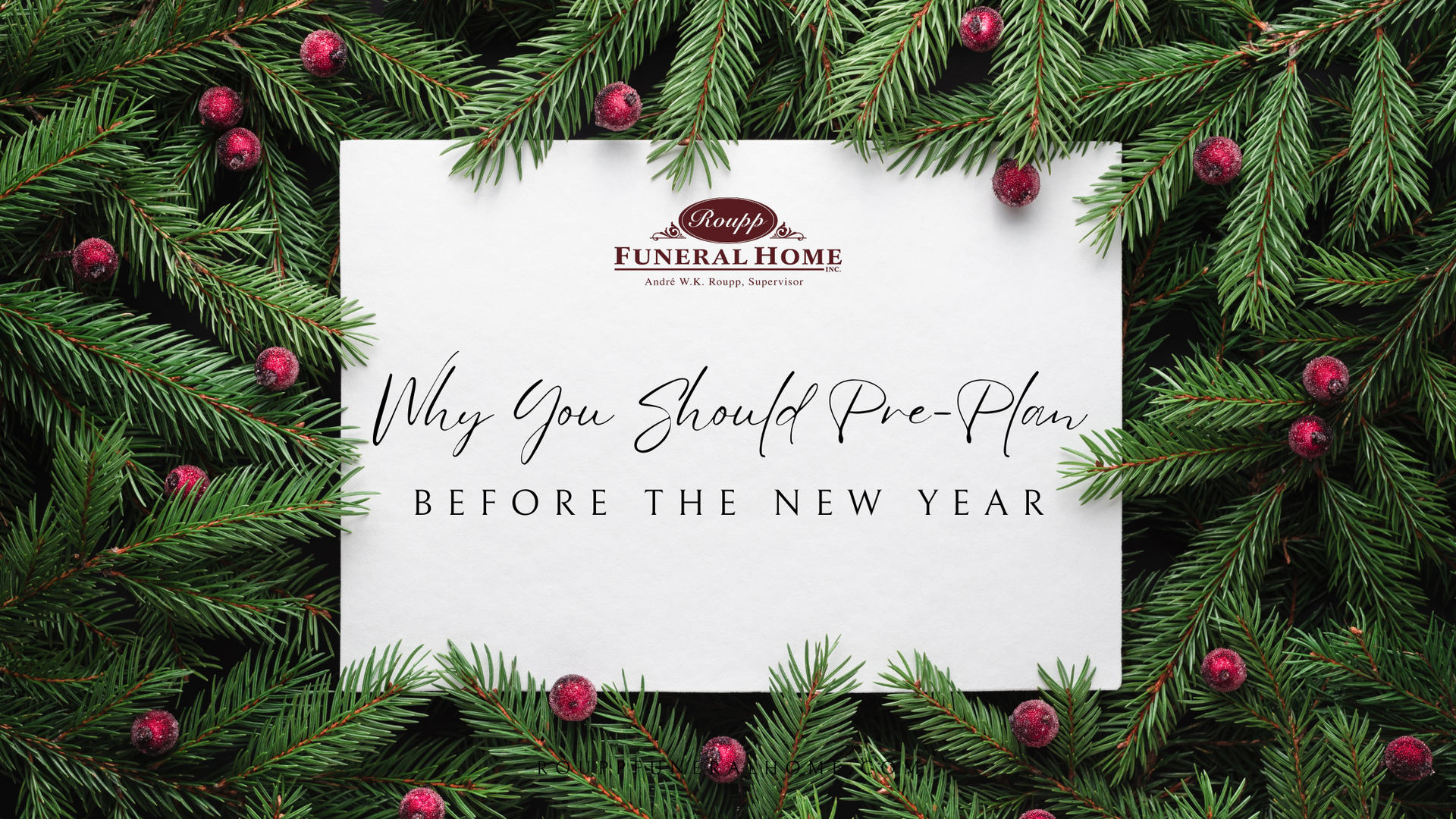
As the year winds down and we prepare to welcome a fresh start, many people begin reflecting on the things that matter most, like family, peace of mind, and creating a meaningful future. New Year’s resolutions often include organizing our homes, tidying up finances, and finally tackling those life details we’ve been putting off. One important but often overlooked part of planning ahead is pre-planning your funeral. While it may not be the first thing on your holiday checklist, taking a little time now to put arrangements in place can be an incredible gift to your loved ones, and to yourself. At Roupp Funeral Home, we believe that pre-planning is about living well today by easing the worries of tomorrow. Here’s why you should pre-plan a funeral before the new year: Peace of Mind Going Into the New Year There is something powerful about checking an important task off your list before January 1. Pre-planning allows you to: Document your wishes Select the type of service that reflects your life Ensure your final arrangements honor your values Instead of leaving loved ones to guess what you would want, you can give them clarity and comfort. Beginning the New Year with peace of mind allows you to focus on what matters most. A Gift of Love for Your Family Losing someone you love is never easy. Planning a funeral while grieving can feel overwhelming. When your wishes are already in place, your family can focus on sharing memories and supporting one another rather than making rushed decisions. Pre-planning: Reduces emotional stress Prevents confusion or disagreements Provides comfort knowing everything is taken care of It is one of the most thoughtful acts of love you can offer. Lock In Today’s Prices and Save Money Funeral costs, like many other expenses, rise over time. When you plan in advance, you can often lock in pricing at today’s rates, which can result in meaningful savings later. Pre-funding your arrangements allows you to: Budget at your own pace Avoid future price increases Protect your family from unexpected expenses End-of-year financial planning may already be on your mind, so this can easily fit into those conversations. Personalize a Service That Reflects Your Life Your story is one of a kind. Pre-planning gives you the opportunity to design a service that reflects your personality, your values, and the things you cherish. You can choose elements such as: Burial or cremation Music, readings, or faith traditions Photos, videos, and personal touches Location and style of service This ensures your loved ones can celebrate your life in a way that feels right and meaningful. The Perfect Time to Have the Conversation The holidays bring families together. While this topic can feel sensitive, many families appreciate having clarity and knowing they are honoring their loved one’s wishes. Having the conversation now means: Everyone understands your choices Loved ones feel included You avoid uncertainty later on Talking about your plans can bring surprising relief and peace to everyone involved. A Fresh, Organized Start Many people use December to catch up on estate planning, such as reviewing wills and organizing important documents. Pre-planning naturally fits into this organizing process and helps keep everything in one place. It is another way to remove worry, stay prepared, and protect your wishes moving into the New Year. Pre-planning your funeral is one of the most caring choices you can make for your family. Our compassionate team at Roupp Funeral Home is here to guide you at your own pace and answer any questions along the way. Even taking a few small steps now can make a big difference later. If you are interested in learning more or starting the process, we are always here to help. Call us at 5709662402 Visit us at Roupp Funeral Home Start planning online at: Online P r eplanning Form | Roupp Funeral Home Make this the year you give your family the comfort of knowing everything is handled. Begin the New Year with confidence, protection, and peace of mind.
